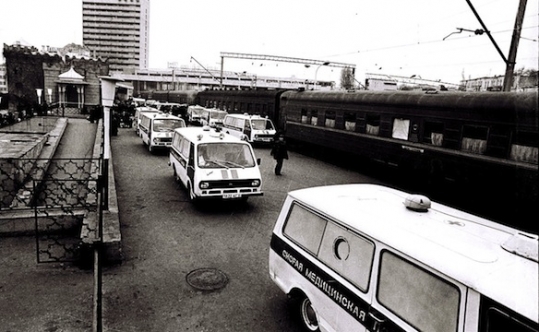
On January 28, addressing the United Nations General Assembly on the occasion of the International Holocaust Remembrance Day, President Reuven Rivlin of Israel said: “On this day we must ask ourselves honestly, is our struggle, the struggle of this Assembly, against genocide, effective enough? Was it effective enough then in Bosnia? Was it effective in preventing the killing in Khojaly?… Are we shedding too many tears, and taking too little action?”
A similar question could be posed to the leaders of the U.S Congress. Will this Congress get more actively engaged in supporting the growing number of civilian populations that are being impacted by painful conflicts in various corners of the world like Iraq, Nigeria and Syria among others? Will they nonselectively condemn these and similar atrocities and do more to stop them? Congressional leaders have a unique position to engage the world’s attention in so many ways. But treating equally all atrocities, past and present, no matter where they take place and who the culprits are, is an important prerequisite for preventing the future tragedies.
The town of Khojaly that President Rivlin referred to might sound unfamiliar to some. But Khojaly was the scene of one of the most horrific tragedies in modern European history.
Twenty-three years ago, I watched in horror as TV screens in Azerbaijan showed the aftermath of a brutal event: dead women, children and elderly, mutilated bodies, frozen corpses scattered across the ground. This shocking footage was taken at the site of the Khojaly massacre. 613 Azerbaijani civilians, including up to 300 children, women and elderly, were ruthlessly murdered.
The massacre took place on Feb. 26, 1992 when Azerbaijani civilians, attempting to evacuate the town of Khojaly in freezing cold after coming under attack, were gunned down by Armenian troops as they fled towards the safety of Azerbaijani lines. This brutal attack was not simply an accident of battle, it was part of Armenia’s deliberate policy of terror to intimidate others into fleeing the region, allowing Armenia’s army to occupy NagornoKarabakh and other regions of Azerbaijan. This was ethnic cleansing, pure and simple.
This policy of terror was acknowledged by the very men in charge of it. Serj Sargsyan, then one of the most senior Armenian military commanders and now the country’s president, told the British journalist Tom de Waal in 2000 that “Before Khojaly, the Azerbaijanis thought that they were joking with us, they thought that the Armenians were people who could not raise their hand against thecivilian population. We needed to put a stop to all that. And that’s what happened.”The international humanrights group Human Rights Watch called Khojaly the “largest massacre in the conflict”.
Ever since, Azerbaijan has worked for the Khojaly massacre to be recognized by the international community. And the world has responded: countries from Mexico to Peru and from BosniaHerzegovina to Colombia, as well as over a fifteen U.S. states, including Arkansas, Georgia, Pennsylvania, New Mexico, Oklahoma, Texas, and others have all passed relevant resolutions condemning the Khojaly massacre and its brutality.
More than two decades after Khojaly, Armenia’s illegal occupation of 20% of Azerbaijan’s internationally recognized territory still continues, and nearly a million Azerbaijani refugees remain uprooted.
This illegal occupation has not brought any benefits to Armenia – on the contrary, it has only weakened the country. Its economy is quickly plummeting, and its population is dwindling.
By contrast, Azerbaijan has become the world’s fastest growing economy of the last decade. The country is also a vital strategic partner for the U.S., especially in the areas of the fight against terrorism and global energy security.
Azerbaijan is looking towards the future. But it can never forget the Khojaly tragedy. The perpetrators of this terrible act, not only remain at large: many of them hold office and are feted as ‘war heroes’ in Armenia, while justice for the victims of the massacre remains uncertain at best.
Azerbaijan will continue its struggle to remember the victims of Khojaly. And we would like to see the U.S. Congress join this struggle for justice for those who died in Khojaly. A Congressional recognition of the Khojaly massacre would be the first step in the right direction. It is important, for the sake of the future generations, to make sure that such examples of callous human cruelty do not occur again.
Based in Los Angeles, Nasimi Aghayev is Azerbaijan’s Consul General to the Western United States
Source: Jewish Journal
